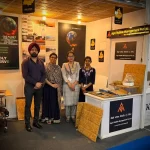- Organisation/Company
-
Swansea University
- Department
-
Central
- Research Field
-
Engineering » Materials engineering
- Researcher Profile
-
First Stage Researcher (R1)
- Country
-
United Kingdom
- Application Deadline
- Type of Contract
-
Other
- Job Status
-
Full-time
- Is the job funded through the EU Research Framework Programme?
-
Not funded by an EU programme
- Is the Job related to staff position within a Research Infrastructure?
-
No
Offer Description
Funding providers: EPSRC and STRIP5 Prosperity Partnership
Subject areas: Photovoltaics, Perovskites, Module design, Engineering
Project start date:
- 1 October 2024 (Enrolment open from mid-September)
Supervisors:
- Professor Trystan Watson (t.m.watson@swansea.ac.uk)
- Dr Eifion Jewell
- Dr David Beynon
Aligned programme of study: PhD in Materials Engineering
Mode of study: Full-time
Project description:
This 4-year PhD position offers an exciting opportunity to join the STRIPS Project (Swansea Tata Research and Innovation Prosperity Partnership for Printed Perovskite PV). As part of the STRIPS project, which encompasses 4-6 PhD studentships across 5 research groups in Swansea, all commencing in 2024, you will be an integral part of a dynamic doctoral cohort. This unique opportunity provides the successful candidate with the chance to collaborate not only with peers in Swansea but with the vast network of projects on photovoltaics across the UK and beyond.
Your role will explore a critical barrier to the successful implementation of the newest revolution in solar energy research – module design and development. Working as part of the existing research team led by Professor Trystan Watson you will explore how the next generation of printed solar cells can be taken from the printing of single layers to the integration of modules into functional panels.
In particular you will consider aspects of module connection from series to parallel connection, minimising shading losses and bypass diodes to new grid based electrode concepts for linking packaged modules to the steel substrate itself to produce a functional product. Overcoming this challenge is essential for their wider adoption in sustainable energy, making it one of the top priorities in the field.
In this pivotal role, the selected candidate will engage in groundbreaking research, with a special focus on taking the modules produced by the STRIPS project and solving the problems required to integrate them into a steel panel which include panel design and layout, electrical connection and adhesion. In addition to academic exploration, this role offers the chance to collaborate with industry leaders, bridging the gap between theoretical research and practical, scalable applications. This initiative is not merely about advancing solar technology but is a commitment to contributing towards a sustainable energy future through durable, efficient solar solutions
Candidates with a keen interest in solar energy, perovskite photovoltaics, materials, electrical, mechanical and process engineering are encouraged to apply. If you possess a diverse skill set and are passionate about highly applied and impactful research, we invite you to apply for this exciting opportunity to shape the future of sustainable energy technologies.
Associated projects:
Requirements
- Research Field
- Engineering
- Education Level
- Bachelor Degree or equivalent
Candidates must hold a UK bachelor’s degree with a minimum of Upper Second Class honours or overseas bachelor’s degree deemed equivalent to UK honours (by UK ECCTIS) and achieved a grade equivalent to UK Upper Second Class honours in Engineering or similar relevant science discipline. If you are eligible to apply for the scholarship but do not hold a UK degree, you can check our comparison entry requirements. Please note that you may need to provide evidence of your English Language proficiency.
English Language: IELTS 6.5 Overall (with no individual component below 5.5) or Swansea University recognised equivalent.
This scholarship is open to candidates of any nationality.
ATAS
Please note that the programme requires some applicants to hold ATAS clearance, further details on ATAS scheme eligibility are available on the UK Government website.
ATAS clearance IS NOT required to be held as part of the scholarship application process, successful award winners (as appropriate) are provided with details as to how to apply for ATAS clearance in tandem with scholarship course offer.
Additional Information
This scholarship covers the full cost of tuition fees and an annual stipend of £19,237.
Additional research expenses will also be available.
Candidates must hold a UK bachelor’s degree with a minimum of Upper Second Class honours or overseas bachelor’s degree deemed equivalent to UK honours (by UK ECCTIS) and achieved a grade equivalent to UK Upper Second Class honours in Engineering or similar relevant science discipline. If you are eligible to apply for the scholarship but do not hold a UK degree, you can check our comparison entry requirements. Please note that you may need to provide evidence of your English Language proficiency.
English Language: IELTS 6.5 Overall (with no individual component below 5.5) or Swansea University recognised equivalent.
This scholarship is open to candidates of any nationality.
ATAS
Please note that the programme requires some applicants to hold ATAS clearance, further details on ATAS scheme eligibility are available on the UK Government website.
ATAS clearance IS NOT required to be held as part of the scholarship application process, successful award winners (as appropriate) are provided with details as to how to apply for ATAS clearance in tandem with scholarship course offer.
Please visit our website for more information.
- Website for additional job details
Características del Puesto
| Categoría de Puesto | Doctorat, Ingénierie et technologie |





